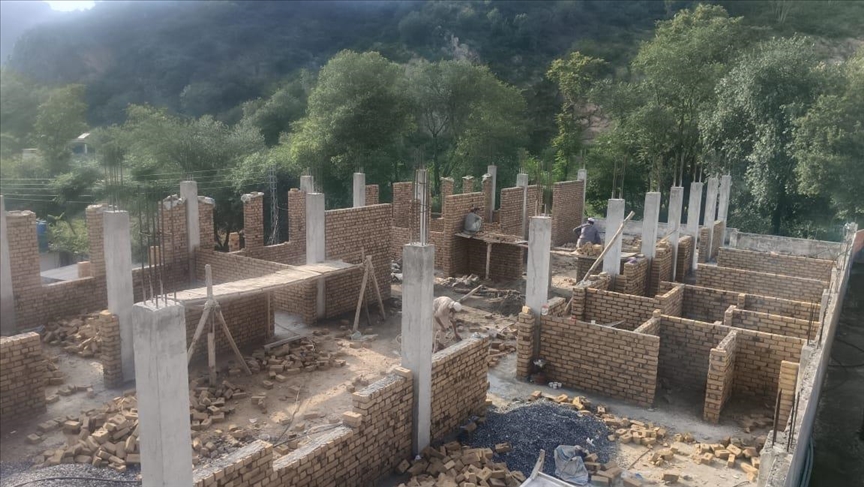Pakistan’s social sector adapts to survive global aid cuts
Multi-donor strategies and diaspora funding have helped Pakistani NGOs stay afloat after sudden end to USAID support, say experts

- Experts agree that Pakistan’s development sector has shown surprising resilience in navigating a new era of constrained international support, bolstered by growing diaspora support and domestic government contributions
KARACHI, Pakistan
The Trump administration’s abrupt decision to terminate foreign aid, including funding through the US Agency for International Development (USAID), delivered a jolt to Pakistan’s social sector, forcing many organizations to halt projects, lay off staff, and scale back operations.
Days after beginning his second term in January, Trump announced a pause in all foreign assistance under his “America First” policy. The move further deepened an already challenging funding environment in Pakistan, where donor fatigue and shifting priorities have chipped away at global aid streams in recent years.
Still, Pakistan’s development sector has managed to absorb the initial shocks. Experts say a shift in strategy, bolstered by growing support from the Pakistani diaspora and domestic government contributions, has helped NGOs keep their work alive.
“Pakistan’s decades-old development sector, particularly the big NGOs, are deep-rooted, and are pursuing a multi-sectoral and multi-donor approach to avoid dependence on one or a few donors,” said Naseer Memon, an Islamabad-based social sector expert.
Although USAID was not the only donor for Pakistan’s development initiatives, its sudden withdrawal disrupted several key health, education, and community welfare projects, Memon told Anadolu.
However, local NGOs adapted quickly by diversifying their funding sources and relying more on domestic and diaspora-based support to avoid a full collapse.
European nations, too, have funded programs focused on religious harmony and democratic governance in Pakistan, particularly during the post-9/11 “war on terror,” helping broaden the country’s donor landscape, Memon added.
Restructuring and resilience
Another factor that has helped local NGOs, according to Memon, is Pakistani government funding for a slew of social sector projects.
One major recipient of USAID funds, the Sindh Rural Support Organization (SRSO), was forced to shut down three health projects in the southern province after the funding freeze – two of which were in full swing and one just getting started.
Mohammad Dittal Kalhoro, SRSO’s head, said his organization had to let go of several staff members, but almost 90% were re-employed within months through project restructuring and cost-cutting.
“We either retained or re-hired employees (affected by USAID cuts) for other projects where we had some cushion, or new projects that we launched later,” Kalhoro told Anadolu.
One of the previously halted projects was restored by USAID in June, enabling further rehiring and expansion, he added.
Diaspora stepping up
Increasingly, Pakistani NGOs are relying on funds from the diaspora. More than 8 million Pakistanis live abroad, mainly in the US, Europe and the Gulf states, and send home over $30 billion in remittances each year.
This financial lifeline is now helping charities and NGOs complete health, education, and water-related projects, particularly in underserved rural areas, said Memon.
Ali Mohsin, a Pakistani-Canadian engineer, has been raising funds for an eye hospital in Dir, a district of the northwestern Khyber Pakhtunkhwa province near the Afghan border. Between 2012 and 2024, Canadian Pakistanis helped complete 12 major projects in health, education, and clean water, while another 10 are underway this year alone, said Mohsin, who works with Al-Khidmat Foundation, the charity wing of socio-religious party Jamaat-e-Islami.
Umair Idris, a director at the foundation, also emphasized the importance of diaspora funding, saying that 35% of the charity’s budget now comes from overseas Pakistanis – a 10% increase from 2020 levels.
The Citizens Foundation, which runs a network of more than 2,000 schools nationwide, has also seen soaring diaspora support.
“Previously, we would receive 30% of our overall funding from overseas Pakistanis,” Mushtaq Kassim Chhapra, the organization’s founding director, told Anadolu.
“This share has jumped to around 40% to 42% over the past few years, particularly because they (overseas Pakistanis) have confidence and trust in our work.”
Global aid decline
The strain on Pakistan’s social sector is part of a larger global trend. Trump’s freeze on US aid, long the world’s largest donor pool, triggered similar budget cuts from other countries, leaving the international development community scrambling.
The Geneva-based Global Fund recently announced it would slash $1.4 billion from previously approved grants, citing uncertainty about donor commitments.
Memon noted that Pakistan’s aid flow had already been declining due to the country’s 2015 foreign funding law, intended to regulate international grants and prevent money laundering. While the law was meant to boost transparency, many NGOs found it burdensome, further deterring foreign donors.
The government, for its part, said the law was necessary to check the sources and objectives of foreign funding into Pakistan.
New global crises have also diverted attention and resources. Wars in Ukraine, Sudan, and most recently Gaza have drawn donors’ focus elsewhere. Despite these challenges, experts agree that Pakistan’s development sector has shown surprising resilience in navigating a new era of constrained international support.
Anadolu Agency website contains only a portion of the news stories offered to subscribers in the AA News Broadcasting System (HAS), and in summarized form. Please contact us for subscription options.







